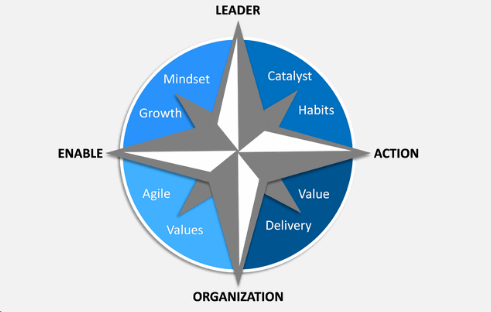In this article, you will find out what’s Leadership Compass, why it’s important, and test what type of leadership you are.
Knowing yourself and acting in a way that fits your personality are the foundations of effective leadership.
As John Maxwell once said, “The wind, according to the pessimist, is bad. The optimist anticipates a change. The leader makes sail adjustments.” To use your leadership to guide your followers toward safety, you must find the appropriate tools.
“The wind is what the pessimist complains about. Optimists anticipate change. Sails are adjusted by the leader.”
-John Maxwell
You’ve therefore come to the right place if you’re unsure of what you need to do to improve as a leader or want to identify the kind of leader you are.
You should be able to respond to these leadership questions and progress toward becoming a better leader with the aid of the leadership compass.
Table of Contents
What’s a Leadership Compass?
Finding the leadership style that best suits or describes you can be done with the aid of a leadership compass. A leadership compass explains the useful principles you can apply to guide a group of people toward a common objective.
What then, is the best leadership style to use given your leadership compass?
The four cardinal points of a compass—North, West, East, and South—serve as a metaphor for everything. These guidelines indicate the kind of leader you can develop into or are already. Every direction represents a leadership style that most leaders tend to adopt.
Let’s see how this functions in terms of leadership.
North: Action
- Likes to be in control; comfortable in a leading role
- Quick and to the point
- Enjoys challenges and newness
- Perseveres; not easily deterred
- Can grow defensive
- Can overlook details, logic, and strategy
- Can produce hasty, incomplete work
- May disregard others’ feelings
- May take too much responsibility
South: Empathy
- Understands others’ feelings and capabilities
- Heeds and integrates work and thoughts of others
- Use relationships to progress
- Willingness to trust others
- Supportive and receptive
- Able to focus on current activities
- Non-competitive
- Can put too much emphasis on relationships over goals
- May over-compromise or have difficulty saying “no”
- May internalize personal issues and take the blame
- May have difficulty dealing with anger
- May become too focused on the now and lose track of the long-term
East: Vision
- Sees the big picture
- Creative and idea-oriented
- Understands the mission and purpose
- Looks for the main themes
- Great at solving problems
- Likes to try new things
- May put too much emphasis on the future and lose track of time
- May burn out over time
- May become easily frustrated, especially when working on something they don’t consider contributing to the main goals
West: Analysis
- Understands and analyzes information well
- Practical, logical, and thorough; notices problems
- Resourceful and helpful
- Sees all sides of an issue
- Examines needs
- May get stuck with too much information to analyze
- Can be stubborn or indecisive
- May become aloof or uncaring of others
Why You Should Consider Using a Leadership Compass
The best leaders are lifelong students. They continually adapt fresh concepts and incorporate them as effectively as possible into their leadership styles.
As J.F Kennedy once said, “Learning and leadership go hand in hand.” You can accomplish this with the aid of a leadership compass.
“Learning and leadership go hand in hand.”
J.F Kennedy
You can develop your leadership abilities and identify the best leadership approach with the aid of a leadership compass. You will gain insight into leadership and be able to pinpoint the qualities of leadership that are most compatible with your personality.
Listed below are some additional justifications for using a leadership compass.
It Promotes Accountability
Everyone learns their personal leadership style with the aid of a leadership compass and will be held responsible for it. Because everyone now follows their own unique leadership style, there is no longer any justification for leadership styles that conflict with leadership abilities.
North Leaders will become aware of their strengths and pick up skills appropriate for their leadership style. By doing this, nobody will hold them accountable for not carrying out their duties in a West-Leader-style manner.
It Creates Transparency
Everyone now has an understanding of their leadership style thanks to the transparency that a leadership compass creates for leadership abilities. This means that instead of speculating or playing office politics, people can collaborate using the leadership philosophies that they are most at ease with.
Leadership Skills Will Improve over Time
Leadership abilities will advance with practice if a leadership compass is used. To increase your chances of becoming the ideal leader you want to be, you can identify your leadership strengths and work to develop them.
It Provides Guidance on Leadership Styles
You can apply the various leadership philosophies in your workplace by using a leadership compass. Then you can apply this knowledge to future tasks, such as mentoring sessions with subordinates or leadership development programs. It makes it simpler to recognize particular leadership qualities that are required at a given time.
It Provides a Guide to the Future of Your Career
You will have a better understanding of what career path might suit your leadership abilities if you receive leadership training and support. When evaluating different job opportunities to find the one that’s best for where you are in life right now, you can also use this information in conjunction with leadership testing.
It Puts You in Control
You can always adjust the settings on your leadership compass to best suit the circumstances. This helps people become more aware of their leadership style and how they interact with others.
People Don’t Have to Change Who They Are
Instead of altering who you are, the leadership compass is intended to alter how you behave in specific circumstances. For instance, if someone enjoys motivating and supporting others, they might frequently find themselves in positions of authority where they are required to push people harder than they would like.
However, with the leadership compass, these people can understand that they should be more demanding and hold their subordinates to a higher standard when using this leadership style.
As Woodrow Wilson put it, “Compromise is not something that all leaders wear as a harness.” Without compromising who you are, you can be an excellent leader using your natural talents.
“Compromise is not something that all leaders wear as a harness.” -Woodrow Wilson

The Challenges of Using a Leadership Compass
Leading a team is never easy; there will always be obstacles to overcome. As a leader, you can’t expect the leadership compass to be a magic bullet that fixes all of your issues. Some of the significant challenges of using this tool include:
It Can Be Overwhelming
Sometimes the leadership compass dictates that you use two or more leadership axes to accomplish your objectives. Combining multiple leadership compass directions can be overwhelming, especially if you have a natural tendency toward just one leadership compass direction.
It is Useless Without Followers
A leadership compass is a great tool for figuring out your leadership style, but it won’t work unless you have followers. Obtaining supporters who share your beliefs and ideals might take longer than you anticipate.
You Could Fail to Lead by Example.
Leadership is useless if you are not setting an example. John Quincy Adams puts it this way, “You are a leader if your actions motivate others to strive for greater goals and learn, do, and become more.”
“You are a leader if your actions motivate others to strive for greater goals and learn, do, and become more.”
John Quincy Adams
People are more likely to follow your leadership if they perceive a consistency between your actions and words. They will find it challenging to have faith in your abilities as the leader if there is a mismatch between your actions and your decisions.
Find Out What Type of a Leader You Are
There are many different leadership styles, but using the leadership compass will help you identify the type of leader you are or want to be. It enables you to choose the ideal leadership approach for every circumstance and offers suggestions on how to enhance it if necessary.
Action Item
Discover what kind of leader you are by using the leadership compass right now.
The leadership compass also enlightens others about their own selves. They can discover what kind of leader they are by watching you lead and by following your decisions.




